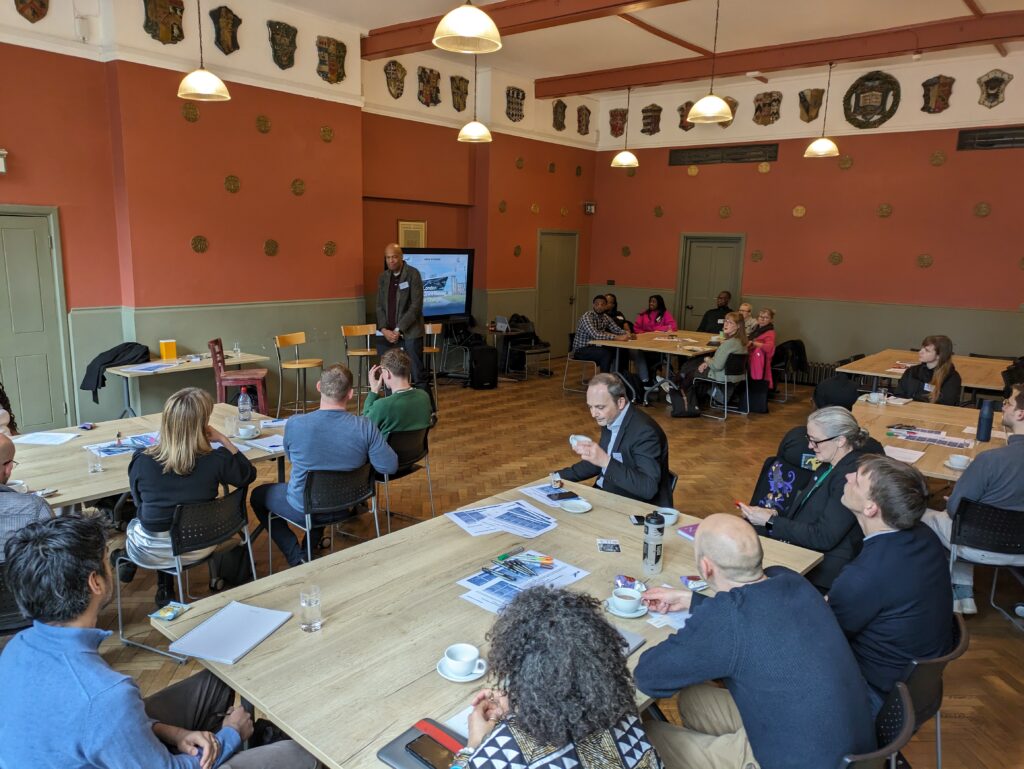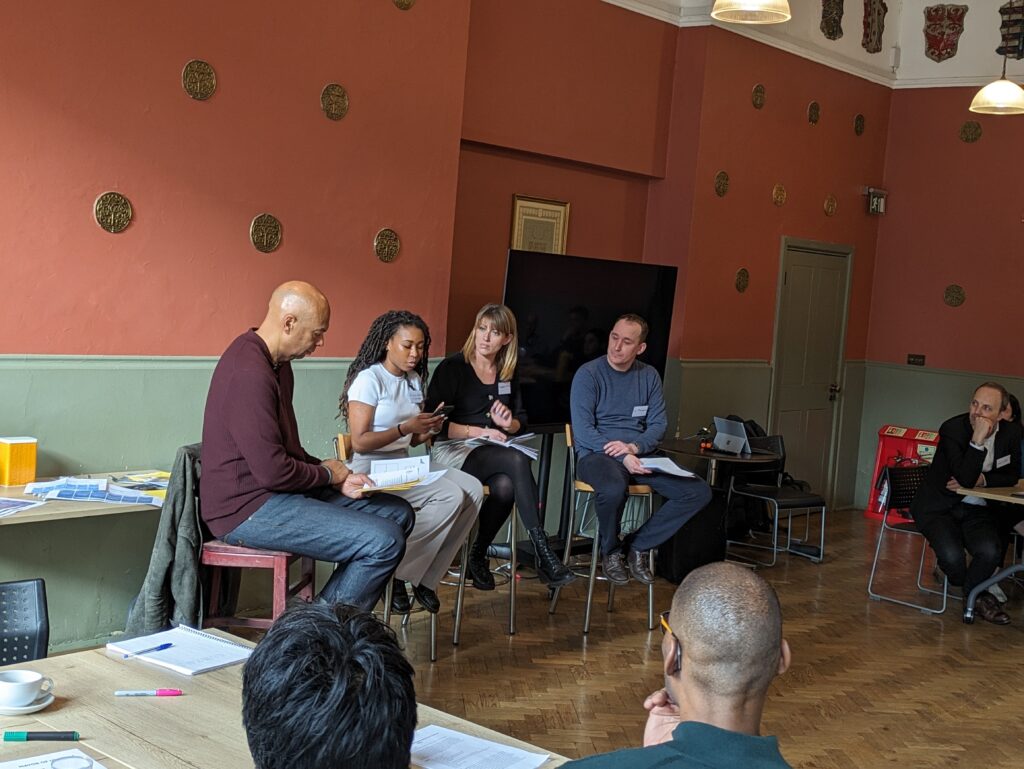How can you foster inclusive decision-making while creating effective initiatives at a local and national level?
Stakeholders, funders, policymakers, and community leaders came together to discuss strategies that work at the “Empowering London: Participatory Grant Making (PGM) for Community-led Change” event.
Attendees heard how Sported’s PGM pilot project, based in London, had made a real difference as well as exploring innovative approaches to community empowerment through processes that put those with lived experience at its centre.
The event was compered by Chris Grant OBE, consisting of two panel discussions.
The funders panel with speakers Anne-Marie Twumasi from the Global Fund for Children, Natasha Friend from Camden Giving and Joe Thompson from London Marathon Foundation explored how funders can develop a PGM Model.
The community focused panel took the audience through Sported’s pilot project, which provided funding for sporting organisations in the black community. On this panel we heard from Tania Moore from Youth Action Alliance, Carl Reid from Southwark Storm and Onyinye Nkemdirim from Sported.
A workshop was also held to explore where funders sit on a spectrum of PGM spanning from the lowest level of participation ‘Community Access’ through the highest – ‘Community Shaped’. Community groups shared their experiences and indicated where funders generally sit on this spectrum.
What were the key learnings?
Community Empowerment through Participation:
The event emphasised the significance of empowering communities by involving them in decision-making processes, particularly in the allocation of resources.
Building Trust and Collaboration:
Establishing trust between funders, policymakers, and community members emerged as a crucial factor in successful participatory grant-making. Collaborative efforts and transparent communication are essential for fostering meaningful partnerships and ensuring that resources are allocated equitably.
Addressing Inequality and Inclusion:
Participants highlighted the importance of addressing systemic inequalities and ensuring that marginalised communities have equal access to funding opportunities. By prioritising inclusivity and diversity in grant-making processes, stakeholders can work towards creating more equitable outcomes and promoting social justice.
Risk and Accountability:
Discussions underscored the risks of not adopting participatory approaches, emphasizing the importance of accountability in decision-making.
Capacity Building and Support:
Providing adequate support and capacity-building opportunities for community organisations is essential for their long-term sustainability and success. Beyond financial assistance, initiatives such as mentorship programs and skills training can empower communities to effectively implement and manage projects.
Youth Engagement:
The panel discussion on the Sported pilot emphasised the importance of representing youth voices in decision-making processes and storytelling. Practical tools were shared to capture stories and feedback from young people creatively, highlighting the significance of youth engagement in community initiatives.
Measuring Impact and Transparency:
Participants discussed the need for robust monitoring and evaluation mechanisms to assess the impact of funded projects accurately. By tracking outcomes and collecting feedback from community members, funders can ensure accountability and continuously improve grant-making practices.
Implications and Future Directions:
The event underscored the potential of participatory grant-making models to drive positive change and empower communities to address local challenges effectively. Moving forward, it will be crucial for stakeholders to continue collaborating and sharing best practices to strengthen these approaches further.
Outcomes
By highlighting the importance of inclusivity, collaboration, and accountability, the event underscored the transformative potential of empowering communities to shape their own futures.
As stakeholders continue to champion these principles and work towards more equitable and resilient communities, participatory grant-making initiatives will undoubtedly play a vital role in driving positive social impact.
To gain further useful insights on how PGM can transform the way you work, read Sported’s full report from our successful pilot to deliver the Black Community Sport and Physical Activity Fund.


Speakers:
- Chris Grant, OBE. From 2014 – 2018, Chris was CEO of the UK-wide Olympic and Paralympic legacy charity, Sported. With a longstanding interest in, and commitment to, challenging sexism, racism and other forms of discrimination, Chris has helped global industries to think about their social impact. He was a member of the Commission on the Future of Women’s Sport, chaired by Dame Tanni Grey-Thompson. He has served as an Independent Board Member of Sport England, where he was the driving force behind the Talent Inclusion Advisory Group, aiming for national teams across all sports to reflect the broader population in terms of socio-economic background; ethnicity and other factors. He was Deputy Chair of the Board of International Inspiration, the groundbreaking London 2012 International Development Programme, which reached more than 20 million children around the world, and has also sat on the Board of the Youth Sport Trust and Comic Relief’s UK Grants Committee. As facilitator of large events, he’s shared stages with multiple professors, CEO’s, political leaders and with Muhammad Ali.
- James Banks, MBE, Chief Executive London Funders Network. James has grown the reach and impact of the London Funders Network, enabling members from across the public, private and philanthropic sectors to work collaboratively to achieve positive change. Through Covid-19 he brought over 400 funders together to sign the “We Stand With The Sector” pledges to support community action. He enabled the London Community Response collaboration, which saw 67 funders working together to give out £57.7m in grants to support London’s diverse civil society responding to the pandemic. He was recognised by Charity Times for his leadership through Covid-19 as one of the sector’s 20 “Pandemic Pioneers”, and was made an MBE in the Queen’s Birthday Honours List 2022 for his services to charitable funding in London. Previous roles have included Chief Executive at Greater London Volunteering, Trustee and/or leadership roles in civil society support organisations in nine London boroughs, as well as Chief Executive at the Royal Courts of Justice Advice Bureau in central London.
- Bevis Allen, Programme and Policy Officer in Youth and Sport, Greater London Authority. As well as currently being a professional boxing coach, Bevis has a huge passion for Equality, Diversity and Inclusion and is a London Sport Sub-committee Member for Equality, Diversity & Inclusion. He has developed and delivered anti-racism workshops and recently designed a new anti-discrimination online workshop for England Boxing, where until recently he served as an EDI Consultant part-time in 2022. Bevis delivers anti-racism/discrimination and mental health workshops for community sports organisations and in UK Prisons. Bevis has worked for London Sport as Boxing Development Officer, supporting a number of local authorities and National Sports Governing Bodies. An accomplished speaker, Bevis has spoken at the House of Commons, and at UK Sports Anti-Racism Events amongst others.
- Onyinye Nkemdirim, London Regional Manager, Sported. Onyinye has a wealth of knowledge in sport development, group support and community engagement from the higher education sector. Onyinye works with Sported’s 350+ community groups in London, helping them to survive and thrive as they contribute to multiple social outcomes for young people from education and employment to health and wellbeing. Onyinye led Sported’s PGM pilot focusing on empowering Black-led groups in London and has helped further PGM initiatives under Sported in Manchester. Onyinye is also one of Sported’s Inclusion Champions, leading on women and girls in sport, a Learning and Development mentor for the FA Universities Womens’ Leadership Programme and Trustee at Out for Sport.
- Carl Reid, Southwark Storm. Carl brings over a decade of experience in the Sports development, youth mentoring and education sectors. He is passionate about passionate about being a role model and empowering his community through sport. Having previously worked with local councils and NGBs to deliver targeted programmes, and his current role as Sport development officer at London Youth, his work actively tackles inequalities in access to sport and physical activity. As founder of a grassroots community basketball club, Carl brought first-hand experience to his role in the decision-making panel of the Black Community Sport and Physical Activity fund.
- Tania Moore, CEO, Youth Action Alliance Tania has spent over 20 years in youth and community work and is passionate about transforming youth work and the lives of young people. She took on the lead role of running Youth Action Alliance in 2019 at a time of public funding cuts in youth work. Tania is working on building a youth service where young people always come first and all possibilities translate to reality. Tania also brings first-hand experience in PGM, with her role in the decision-making panel of the Black Community Sport and Physical Activity fund.
- Joe Thompson, Head of Funding, London Marathon Foundation. Joe is committed to empowering and connecting communities and delivering social impact. Passionate about social justice and the health, wellbeing and societal benefits of sport and physical activity, he holds 16 years’ experience of supporting happier and healthier communities through inclusive sport and physical activity initiatives, public health programmes and the development of community facilities.
- Natasha Friend, Director, Camden Giving. Natasha joined Camden Giving in April 2017, an independent charity that connects people who live, work and play in Camden to create sustainable, participatory solutions to community challenges. Since 2017 Camden Giving has worked with businesses and residents to invest £1.5million into grassroots community groups. Natasha is part of the Consensus and Programmes Circles for the Participatory Grantmaking Community of Practice and a Civic Futures Fellow. Natasha previously worked in the private sector in sustainability.
- Anne-Marie Twumasi, The Phoenix Way Grants Manager, Global Fund for Children. As Grants Manager, Anne-Marie focuses on dismantling structural barriers faced by Black and racially minoritized communities and community-led organizations in accessing grant funding within the UK. Anne-Marie has worked in various roles across the grantmaking sector, including grant management to grant system architecture at the National Lottery Community Fund, the Avast Foundation, and Big Change Charity. These roles have championed participatory grantmaking processes, incorporating young people and diverse communities into funding decisions. She previously worked as a researcher, exploring academic attainment among Black and minoritised students, race and ethnicity, and evidenced-based policy making.
New to PGM? Read this: Black Community Sport and Physical Activity Fund: Learning from a participatory grant-making pilot
